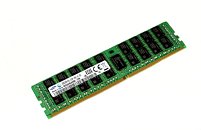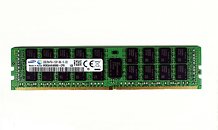Tuesday, October 21st 2014

Samsung Starts Production of 8-Gigabit DDR4 Based on 20 Nanometer Technology
Samsung Electronics announced that it is mass producing the industry's most advanced 8-gigabit (Gb) DDR4 memory and 32-gigabyte (GB) module, both of which will be manufactured based on a new 20-nanometer (nm) process technology, for use in enterprise servers.
"Our new 20 nm 8 Gb DDR4 DRAM more than meets the high performance, high density and energy efficiency needs that are driving the proliferation of next-generation enterprise servers," said Jeeho Baek, Vice President of Memory Marketing at Samsung Electronics. "By expanding the production of our 20 nm DRAM line-ups, we will provide premium, high-density DRAM products, while handling increasing demand from customers in the global premium enterprise market."With its new 8 Gb DDR4, Samsung now offers a full line-up of 20 nm-based DRAM to lead a new era of 20 nm DRAM efficiency that also includes the 20 nm 4 Gb DDR3 for PCs and the 20 nm 6 Gb LPDDR3 for mobile devices.
Using the new 8 Gb DDR4 chip, Samsung began producing the 32 GB registered dual in-line memory module (RDIMM) earlier this month. The new module's data transfer rate per pin reaches up to 2,400 megabits per second (Mbps), which delivers an approximately 29 percent performance increase, compared to the 1,866 Mbps bandwidth of a DDR3 server module.
Beyond the 32 GB modules, the new 8 Gb chips will allow production of server modules with a maximum capacity of 128 GB by applying 3D through silicon via (TSV) technology, which will encourage further expansion of the high-density DRAM market.
The new high density DDR4, also boasts improved error correction features, which will increase memory reliability in the design of enterprise servers. In addition, the new DDR4 chip and module use 1.2 volt, which is currently the lowest possible voltage.
"Our new 20 nm 8 Gb DDR4 DRAM more than meets the high performance, high density and energy efficiency needs that are driving the proliferation of next-generation enterprise servers," said Jeeho Baek, Vice President of Memory Marketing at Samsung Electronics. "By expanding the production of our 20 nm DRAM line-ups, we will provide premium, high-density DRAM products, while handling increasing demand from customers in the global premium enterprise market."With its new 8 Gb DDR4, Samsung now offers a full line-up of 20 nm-based DRAM to lead a new era of 20 nm DRAM efficiency that also includes the 20 nm 4 Gb DDR3 for PCs and the 20 nm 6 Gb LPDDR3 for mobile devices.
Using the new 8 Gb DDR4 chip, Samsung began producing the 32 GB registered dual in-line memory module (RDIMM) earlier this month. The new module's data transfer rate per pin reaches up to 2,400 megabits per second (Mbps), which delivers an approximately 29 percent performance increase, compared to the 1,866 Mbps bandwidth of a DDR3 server module.
Beyond the 32 GB modules, the new 8 Gb chips will allow production of server modules with a maximum capacity of 128 GB by applying 3D through silicon via (TSV) technology, which will encourage further expansion of the high-density DRAM market.
The new high density DDR4, also boasts improved error correction features, which will increase memory reliability in the design of enterprise servers. In addition, the new DDR4 chip and module use 1.2 volt, which is currently the lowest possible voltage.


38 Comments on Samsung Starts Production of 8-Gigabit DDR4 Based on 20 Nanometer Technology
:toast:
As a follow up, even with 16GB of RAM I've kept a 1GB page file, if only for crash dumps and for the rare application than requires it.
There is no substitute to having enough physical memory for whatever task you throw at it, that's all I'm really trying to say.
You do seem to know your stuff and, until aquinus forks out some sources, I'll have to turn to you for questions.
Now, in order to set the pagefile size restrictions you have to go to "Start" -> "Computer" -> "Properties", find there "Advanced system properties" link, click it and then navigate to the "Advanced" tab. There you'll see a "Virtual memory" panel with a "Change..." button. Once you clicked it, uncheck the "Automatically manage page file size for all drives" box, select "Custom size" radio button, type "256" into "Initial size (MB):" textbox and "1024" - into the "Maximum size (MB):" one.
By the way, do you use System Restore?.. I'm asking because this thing can eat up about 1.8 GiB in a matter of 3 programs being installed. It's allowed to use up to 2% of your drive's space by default (e. g. 10 GiB for a 500 GiB HDD), but you can manually lock it (via Command Prompt) to be, say, 2 GiB:
vssadmin Resize ShadowStorage /For=C: /On=C: /Maxsize=2GB
Swap space:
Benefit: You can use more memory than you have.
Your machine won't crash when you run out of physical memory.
There will be place to dump system debug logs.
Disadvantages: Increase disk I/O (and increases as you reach your memory limit.)
Due to I/O wait, the overall system will slow down. (Thrashing)
If you use enough swap space, you could make the machine unresponsive.
No swap space:
Benefit: Pages never leave active memory unless they're being free'd up.
Windows will stay in memory (I find minimizing/maximizing in and out of games to be faster with it disabled but that could be placebo effect.)
No page file will exists, which means you won't have a xGB file sitting on your disk.
SSDs don't like swap.* I'll explain this.
Disavantages:
You can't swap out other applications if you run out of physical memory. In other words, the OS will start killing processes to free up space.
Requires enough memory to hold your entire workload plus Windows.
High memory consumption for Windows. (3.5Gb, full load on boot but it never grows bigger.)
*: Now, the SSD bit. Your right that it's not a ton of writes, but keep in mind that memory pages are very small. Writing one Flash page on an SSD might write 16K pages, several times, where the flash drive might need to erase an entire page to write that data. That along is wasteful which is why it's never good to do this to an SSD as it results in write amplification.
What the page file is, most definitely not in dispute. How it's used in certain situations is what we're debating. Most people will want to leave it on, but there are reasons for turning it off.
on an other note, the reason I, for now and until further arguments make me change my mind, am keeping a small amount of page file is this:
For best performance, do not set the initial size to less than the minimum recommended size under Total paging file size for all drives. The recommended size is equivalent to 1.5 times the amount of RAM on your system. Usually, you should leave the paging file at its recommended size, although you might increase its size if you routinely use programs that require a lot of memory.
Right off of Microsoft.com; knowing that they are the authority on the matter of their own OS, I am inclined to listen to what they have to say regarding Page File.
Obviously, If you have a citeable source to answer :then I would have basically no other qualm about disabling Page File.
I prefer to eliminate unnecessary SSD writes and valuable storage space.